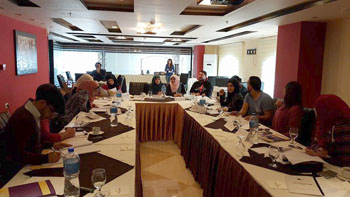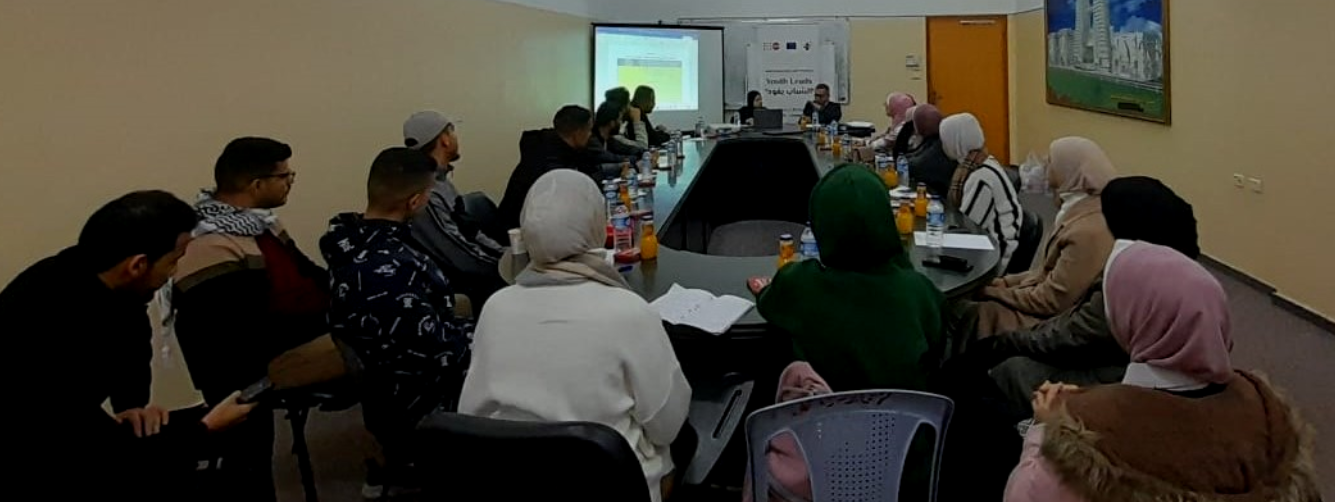
Ramallah – The young journalists who participated in MIFTAH’s four-day workshop, which focused on "the effective use of media in monitoring the general budget and advocate for tax reforms" said it exceeded their expectations of what they had hoped to achieve.
Introduction to the language of economic numbers
Raed Atrash, a young journalist said the workshop introduced them to the language of economic numbers, to ways of writing accurate economic articles and reports and how to distinguish between the two. “Not only do I now have the necessary background on economic writing, but I can link this to relevant issues for ordinary citizens in their everyday lives,” he said.
Learning about the general budget
Another participant, Bassem Zeidani, said while not all of his expectations were met, most of them were. He said he benefited from the subjects on the general budget and the need to focus on numbers, statistics and reports. He said they were introduced to in-depth content in terms of the general budget and tax reform and ways to benefit from them in preparing reports and investigative journalism. “What made this training so unique was that it addressed a subject I have never had training on and which I really need in my line of work,” he said.
Rama Yousef, a young female journalist, said that after learning new skills in the training course she was now able to be more detailed when writing economic subjects. “What was appealing about it was that it addressed issues that are not often discussed; what we learned has brought many economic issues to our attention, which we can now address ourselves.”
Supporting the fourth authority
Hala Khalaileh said what made the training unique was MIFTAH’s focus on economic subjects which were not clear to most of the participants beforehand but which needed to be brought to the fore. This she said, contributed to the strength and impact of journalism as a fourth authority. “In addition, the training opened the door to competition between the journalists who attended once they got back to work.”
Gaining specialized skills
Media and capacity-building supervisor from AMAN, Fadel Suleiman, who oversaw the journalists’ training said: “Many of the participants were very keen on learning and gaining new skills in writing news pieces and reports of an analytical and economic nature. Some were even able to write articles and reports during the workshop that shed light on the economic concerns of Palestinian citizens,” he said. “They were able to raise questions about the ways in which officials handle these concerns.” Suleiman said the training workshop in general was successful and disciplined, saying they agreed to remain in contact with one group of participants, to look at their work and to 'coach' them so they could have an even clearer idea of financial analysis and budgets. “We believe Palestinian journalism is in dire need of experts to address financial issues such as the national budget, expenditures and revenues in addition to economic crises and the concerns of citizens.”
Monitoring and accountability
Suleiman said the training course was part of the overall goal to increase the media’s ability to regain its monitoring and accountability authority and also to enable it to convey information and numbers pertaining to the management of public funds to citizens. “The right to knowledge and information as a human right is what MIFTAH aims for and what we seek to achieve as trainers,” Suleiman maintained. “This is to create an open and transparent environment in the management of public funds so as to avoid suspicions of corruption or those tempted by it.”
Meanwhile, MIFTAH project coordinator Shadi Zeidat said the training was part of the “Tax Justice, Budget Monitoring and Citizens' Participation Project” implemented by MIFTAH in partnership with AMAN, Teachers Creativity Center and ARIJ with funding from and close coordination with OXFAM. The project is aimed at promoting societal monitoring, accountability and follow-up stages of preparations of the general budget in addition to efforts towards tax reform in Palestine.
Data on economic journalism
According to Zeidat, the first day of the training program included a presentation of data about economic journalism and information about the increase of resources and sound distribution in addition to the overall increase of interest in addressing economic issues. This means the media needs to respond accordingly. He also said that media outlets need to respond to the needs of the public and the necessity for the public to have ample information on economic processes and issues.
On the second day, the participants were introduced to three new journalistic themes, which were: economic journalism, explanatory journalism and the key elements to this explanatory journalism in addition to information on in-depth research and collecting background information.
The third day of the training included information on economic journalism, its origins, and its standards as well as data journalism. The participants also learned about the national budget and budgets for programs and performance, planning and programing, zero-based budgets, the stages of preparation of the national budget, the standards of preparing and tabulating budgets, the concepts of revenues and expenditures, the relationship between closing accounts and the national budget in addition to applications of articles from the Palestinian Budget Law.







